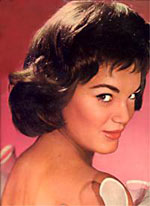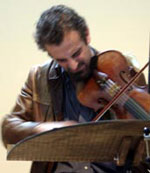Going to Heaven
| |

| Where to begin? Perhaps with that Konitz itch that's been bugging me for weeks now (I should consult Doctor Jazz about that one)... The untold riches of the Italian Instabile Orchestra, and their obsessive loops around traditional Italian music and healthily coarse jazz innovation... Or I could start with how I rediscovered Connie Francis and Rosemary Clooney this week, some gems tucked away in my vinyl stacks which rightly hadn't succumbed to the recent purge. The Connie Francis reminded me how much soul is in that voice, and even though she has a reputation as a purveyor of wholesome pop froth, there's a directness in how she sings that stamps her authority on the material. Forget the banalities of 'Lipstick on your Collar,' I always preferred her in Tony Bennett mode. Like her fellow Italian-American, she was fearless fronting an orchestra of stalwarts, standing well-drilled and simmering with intent. The MGM lp that's been on my turntable is Songs to a Swinging Band, where she's backed by a crack team of studio commandos ready to reinforce her every note and sigh. I love her version of 'Angel Eyes,' all hyperventilating emphasis and soaring emotion, radically different from Sinatra or Mark Murphy's end-of-the-line desperation. Connie does yearning in her own grand style, her version of ballad 'Senza Fine' melting most men's resistance more effectively even than Peggy Lee's. She can galvanize proceedings by a simple flick of the fingers- the arrangements don't outstay their welcome, driving her irresistibly sly deviations from Dino's trademark 'You're Nobody til Somebody Loves You.' That's amore. Like Julie London, or the best of comedienne-singer Judy Holliday, these are performances that really put a song on the map, tell you where it's coming from and wrench it dry of emotional content. Similarly, Clooney walks the line between pop and jazz- file under easy listening if you like, but it's an unfair label. With her voice bathed in a million and one Nelson Riddle strings on the simply titled Love, it's ideal Sunday afternoon (or morning) listening. The voice breathes violet for your furs in a chandelier setting, and her breathy tone doesn't need to strain for emphasis when allowed to shimmer in this setting. Maybe I'm turning into David Jacobs, but these are records that should be dusted down and appreciated as examples of the fine art of song. On those records the voice is everything, assertive, frosty, fiery or understated- blue velvet lining for lasting moments. Wasn't Mel Tormé known as the velvet fog? I can see Cath Carroll stepping into this kind of repertoire, cool and silky. A lesson in dramatizing a well-worn standard so that it comes up fresh-sounding, straight from the Irving Berlin ink-pen. It's a lesson learned early on by Sally Rodgers of A Man Called Adam, who've been ahead of the game for over a decade now. A chance charity shop find of an early gem today, the 12' of 'I Want to Know,' proves they were experimenting with the collision between perfect pop and dance liberation back in 1991. The quote from Emerson (sadly not the Brazilian footballer, but the American philosopher) on the back cover has them aiming high, higher than the sun: "The influence of the senses have in men overpowered the thought to the degree that the walls of time and space have come to look solid and insurmountable... Yet time and space are but inverse measures of the power of the mind. Man is capable of abolishing them both." Seeing them at the Jazz Café last Summer was welcome proof they haven't traded in their knack for writing songs with lasting hook-lines just yet, as they've taken a turn into country-and-western inflections. Heaven Now, says the title of one of their new songs. On the evidence of that night, it seems they never left. |

| [Expansions.] Matthew Shipp is another follower of the Emerson credo, seeking Greatness in the expansive consciousness of the Self-reliant self. His Blue Series on Thirsty Ear is building up a fair head of steam, with innovative summit meetings between jazz, electronica and hip hop from Springheel Jack, DJ Spooky and the Anti Pop Consortium. I hadn't noticed until now, but there's an implicit nod to Blue Note records in the title of the series, unless that's just my sense of history taking over. The latest to capture my attention has been jazz violinist Mat Maneri's new effort, Sustain. There's a marvellous passage of eructating bass-work by the ever-present William Parker on bass that has me thinking of the visionary, architectural designs evoked by many a Blue Note release during their peak 50's and 60's output. Dig those titles... Evolution, Expansions, Exponents, Inventions and Dimensions, Notes and Ringtones. I've casually invented one or two myself just there, to check you're paying close attention. This new Maneri release takes time to dig its heels in, but when it does you feel in safe hands. There's more than a hint at times of Miles during his In a Silent Way phase, but Maneri keeps the contrast and tone output as vivid and striking as possible. The first half of the record (what would have been side one, but wouldn't work as well on vinyl, as this is flowing, continually evolving music) churns and crawls away, a mutant creature dragging its tail through the slime. This is music set in Bayou country, the moon casting shapes over eerily tranquil swampland. The record has me thinking of the violin at its most compressed and introspective, echoes of long dwindling gypsy laments evoked amid the cauldron of pyrotechnics appearing on the second half of the recording. The tight focus of Maneri's lean, stark lines is as compressed and volatile as tango maestro Astor Piazzolla in his prime. I'll stick my neck out and make that comparison because, for me, it's what the label's all about. Much more so than trading on jazz 'tradition.' Piazzolla fiddling while civilization dies, which are the typical ingredients of tango-obsessed Hungarian director Bela Tarr's work. Films like the aptly named Satantango and rainsoaked Damnation are set in the dying embers of a bleak, industrial East European landscape, with breathless camera movements tracking across devastated marshes. Tarr can test the patience of all but the most devoted, so that Satantango fills its seven-hour canvas with, well, vast tracts of empty space and time, dead weight craning out of its spent shell. Tarr is a descendant of master spiritual director Tarkovsky, but his grim films should carry a health warning. High Tarr content, approach with caution. Maneri, though, carves out room for reflection and renewal in his nocturnal communion with the spirits. The titles suggest desolation and hint at defeat, but by the record's end the experience has been worthwhile, the wounds have been dressed neatly and the group has pooled its vision into compacted shapes. The album is structured around one piece, 'Alone,' divided into movements and interrupted by tracks between these variations. 'Alone' moves through plateaux of emphasis, from 'Origin' through to 'Mourn.' The album cuts itself free of excessive introspection, though: 'Nerve' is a high octane blow-out, powered by the presence of Joe McPhee on soprano sax. His high-pitched squealing is perfectly suited to the ensemble of performers here, adding to the variety of colour and resonance. The great McPhee is at ease with the immense, bowed shifts of Parker's guttural bass. The squawks of the tight unit will enthrall and infuriate in the best free jazz manner. If the thought of new thing jazz is as appealing as the sound of your cat being strangled, it's worth persisting with this one. If you want to see one record rotating during those round about midnight sessions this year, this should be it. Maneri called this new entry Sustain. I call it Cante Jondo, music of the deep. © 2003 Marino Guida |